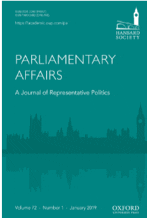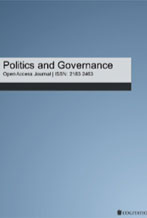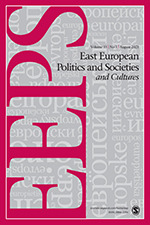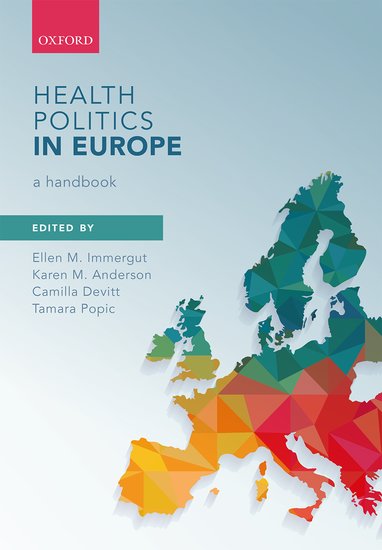Articles and working papers
Articles and working papers

East Central Europe in the Covid-19 Crisis (special issue)
Bohle, Dorothee & Eihmanis, Edgars
East European Politics, 38(4) https://www.tandfonline.com/toc/fjcs21/current
Abstract: This article introduces the Special Issue on Eastern Europe in the COVID-19 crisis. It seeks to shed light on the different and partly worse experiences in East Central Europe compared to those of the West by analysing the crisis, its governance, and effects in the region from the vantage point of specific vulnerabilities, which have been building up for years. We identify four major vulnerabilities – a severe crisis of care, strains in social solidarity, democratic erosion and dependent capitalism – which have contributed to the East having experienced high infection and death rates, major economic crises, and pandemic power grabs.
contributions:
Anghel, Veronica, and Erik Jones. 2022. “Riders on the Storm: The Politics of Disruption in EU Member States During the COVID-19 Pandemic.”
Bohle, Dorothee, Gergő Medve-Bálint, Vera Šćepanović, and Alen Toplišek. 2022. “Riding the Covid Waves: Authoritarian Socio-Economic Responses of East Central Europe’s Anti-Liberal Governments.”
Guasti, Petra, and Jaroslav Bílek. 2022. “The Demand Side of Vaccine Politics and Pandemic Illiberalism.”
Guasti, Petra, and Lenka Buštíková. 2022. “Pandemic Power Grab.”
Liu, Amy, Eoin Power, and Meiying Xu. 2022. “The Framing Effects of Covid-19 on Ethnic Intolerance: Evidence from Romania.”
Naczyk, Marek, and Cornel Ban. 2022. “The Sputnik V Moment: Biotech, Biowarfare and COVID-19 Vaccine Development in Russia and in Former Soviet Satellite States.”
Popic, Tamara, and Alexandru Moise. 2022. “Policymaking in a Changing Crisis: The Role of Healthcare and Economic Factors in Policy Responses to the COVID-19 Pandemic in Eastern and Western Europe.”
Toplišek, Alen, Nils Oellerich, Jasper Simons, and Edgars Eihmanis. 2022. “Path Dependency and Partisan Interests: Explaining COVID-19 Social Support Programmes in East-Central Europe.”

Ratification of the Comprehensive Economic and Trade Agreement (CETA): Towards a New Structure of Political Conflict?
Maatsch, Aleksandra
Polish Political Science Review, 2022, vol 10(1): 21-34.
Abstract: Has the high-profile public opposition to recent EU trade agreements supplanted the traditional socio-economic pattern of competition in European trade policy with a value-driven one? This article draws on new data analysing the outcome of the ratification process of a mixed free trade agreement (CETA) in the European Parliament and in all national parliaments that have so far completed ratification. With help of a logistic regression model analysing the vote-outcome, this article demonstrates that despite high social salience, economic considerations remain prominent. Values (TAN-GAL cleavage) were relevant but played a different role than expected. Against the expectation, green parties associated with the GAL-spectrum voted against CETA demonstrating that party preferences on specific values do not necessarily coincide or generate the same policy preference.

How Populists Change Parliaments
Maatsch, Aleksandra & Miklin, Eric
Review of Democracy, posted on 9th November 2021
Abstract: Populism is still considered to be one of the major contemporary challenges of the European Union. Although the phenomenon of populism has been studied from various angles, the literature has not yet provided a conclusive answer with respect to the basic question, namely the impact of populist parties in government on national parliamentary powers. More precisely, how does the presence of populist parties in the executive branch generate disempowerment, empowerment, or no change of national parliamentary core powers regarding law-making, scrutiny, and representation? Below we present the findings of a research project covering six EU member states. For the purpose of the study we have adopted a minimalist definition of populism drawing on two elements: anti-elitism and anti-pluralism.

Special Issue of Parliamentary Affairs
REPRESENTATIVE DEMOCRACY IN DANGER? THE IMPACT OF POPULIST PARTIES IN GOVERNMENT ON THE POWERS AND PRACTICES OF NATIONAL PARLIAMENTS
Editors: Maatsch, Aleksandra & Miklin, Eric
Parliamentary Affairs, gsab006, https://doi.org/10.1093/pa/gsab006
Abstract: Over recent years, probably no other phenomenon has received greater academic attention amongst scholars of political science than populism. While the meaning of the term continues to generate deep controversies[1], there is a broad consensus on populism constituting one of the most serious challenges to contemporary politics. This special issue investigates to what extent the electoral success of populist parties has had an impact on the powers and practices of national parliaments. More specifically, we focus on parliaments, where populist parties have been part of the government coalition. Of course, populist parties may affect parliamentary behaviour and powers also when in opposition. However, the potential for changes increases significantly once they become part of a parliament’s governing majority: in opposition, populists may play the game of parliamentarism differently than other parties. As governing parties, however, they might even change the very rules of the game. We therefore pose the following research questions: How does the presence of populist parties in government influence the core functions of parliaments (law-making, scrutiny, representation and the linkage function)? Does the presence of populist parties in government lead to (a) erosion of representative democracy, (b) strengthening of representative democracy or perhaps (c) to no change at all?
Contributions:
HOW FAR CAN POPULIST GOVERNMENTS GO? THE IMPACT OF THE POPULIST GOVERNMENT ON THE HUNGARIAN PARLIAMENT
Ilonszki, Gabriella & Vajda, Adrienn
Abstract: The paper poses the following research questions: To what extent has the populist executive in Hungary affected formal and informal parliamentary powers? To what extent has the relation between the executive and the legislative changed over the three legislative periods of populist government? This paper examines change in formal powers but also in the informal practices concerning parliament’s legislative and scrutiny functions. Regarding the time-frame, the empirical analysis compares the period when Fidesz was in opposition (2006–2010), with the period when Fidesz has been in government (2010–2020). The paper establishes that during 2010–2020, the legislative suffered profound disempowerment that has been attributed to three factors: systemic collapse of democracy in Hungary, weakening formal powers of the legislative and the autocratic features of the Fidesz party. Moreover, the paper demonstrates that executive–legislative relations have been dynamic between 2010–2020 and concern different formal and informal practices.
DISEMPOWERMENT THROUGH THE BACKDOOR: THE IMPACT OF POPULIST PARTIES ON THE NATIONAL PARLIAMENT IN POLAND
Maatsch, Aleksandra
https://doi.org/10.1093/pa/gsab008
Abstract: Do populist governments disempower parliaments? If so, which strategies do they employ to do it? The empirical analysis here concerns two legislative periods in Poland: T1 2011–2015 (centre-right coalition, populist actors in the opposition) and T2 2015–2018 (populist government). The article traces changesinformal rules regulating scrutiny and law-making but also how these rules were interpreted and exercised. The article addresses the following explanatory factors: position in government, strength of parliamentary formal provisions, and the readiness of political actors to revise institutional competences. The article shows that although changes to formal parliamentary powers were minor, disempowerment of the legislative was profound. The outcome has actually been achieved through radical changes in parliamentary practices regarding both law-making and scrutiny.
CATALYSING MARGINALISATION? THE EFFECT OF POPULIST GOVERNMENTSON THE LEGISLATIVE AND SCRUTINY FUNCTIONS OF THE ITALIAN PARLIAMENT
Fasone, Cristina
https://doi.org/10.1093/pa/gsab009
Abstract: The article analyses whether and how the activity of populist governments in Italy has affected the performance of parliament’s legislative and scrutiny functions. The analysis covers the government of 5SM and the Lega as well as the coalition government made up of the 5 Stars Movement (5SM), the Democratic Party and centre-left junior allies up to the COVID-19 outbreak. The article uses selected bills and decree-laws to investigate the impact on the legislative function, while question time sessions and committees of inquiry are examined as case studies on the scrutiny function. The analysis demonstrates that although ‘subversive’ constitutional and parliamentary conduct was already in place beforehand, when populists entered government in the 18th legislative term there was a worsening of a trend towards eroding representative democracy.
CONFRONTATIONAL BUT RESPECTING RULES: THE MINOR IMPACT OF THE FINNS PARTY ON LEGISLATIVE-EXECUTIVE RELATIONS
Poyet, Corentin & Raunio, Tapio
https://doi.org/10.1093/pa/gsab010
Abstract: Having achieved a major breakthrough in the 2011 elections, the Finns Party remained in opposition but joined the governing coalition from 2015 until 2017 when the party suffered a serious internal split. This article shows that the overall impact of the populists on parliamentary procedures and culture has been modest. The Finns Party has adjusted to the strongly institutionalized parliamentary norms and it has not contested the existing patterns of legislative–executive relations. The populists have brought more confrontational elements to the debates but seem content operating within the established institutional constraints. Content analysis of oral and written questions shows the internal diversity of the party.
DO COALITION GOVERNMENTS WITH POPULIST PARTIES ATTEMPT TO RATIONALIZE CONDUCT OF LAW-MAKING IN PARLIAMENTS? EVIDENCE FROM THE CZECH CHAMBER OF DEPUTIES
Zbiral, Robert
https://doi.org/10.1093/pa/gsab011
Abstract: Populism might be a threat to parliamentary democracy but does not automatically signal its demise. First, not all populist parties seek illiberal goals. Second, in Europe most populist parties entering governments have done so as coalitions with mainstream parties. Yet, almost all populists, including the non-extremist and ‘integrated’ ones, call for more efficient governance. We assume that once in the executive, that objective will also manifest itself in the rationalization of law-making in legislatures. By applying a more assertive strategy and exploiting existing rules, cabinets will attempt to streamline their legislative agendas. We test this theoretical framework on empirical evidence from the Czech Chamber of Deputies, which can serve as prototypical case. Since 2010, three coalition governments have ruled. In the last two, the influence of populist parties (represented by ANO under the leadership of Andrej Babiš) gradually increased. By tracking the legislative performance of cabinets in the Chamber, we found that executives with a populist presence actually fared worse than their non-populist predecessor (baseline) in almost all proceedings and outcomes of law-making. The bills submitted by the last government, where ANO dominated, even suffered the most. Contrary to our assumption, a strategy of rationalization has therefore not succeeded. The findings open interesting questions about how effective cabinets with populists are in law-making in parliaments, and about the future of legislatures as resilient safeguards against the populist challenge.
POSITIVE SIDE EFFECTS? THE IMPACT OF POPULIST RADICAL RIGHT PARTIES IN GOVERNMENT ON THE MEDIA VISIBILITY OF THE AUSTRIAN PARLIAMENT
Miklin, Eric & Dolezal, Martin
https://doi.org/10.1093/pa/gsab012
Abstract: This article takes up the scholarly debate on the relationship between populism and democracy and analyses the effect populist radical right parties (PRRPs) in government have had on the representativefunction of the Austrian parliament. Building on insights from theories of newsworthiness, we expect these parties to positively affect the visibility of parliament due to the increased conflict between governing and mainstream opposition parties – thereby increasing parliamentary accountability. Our analysis covers the period from 1994 to 2020, with PRRPs in government from 2000–2007 and again from 2017–2019. Empirical inference is based on the weekly coverage of the Austrian parliament’s first chamber (Nationalrat) in a sample of four daily newspapers. The findings show that the first term in government did indeed have a positive and significant effect on media coverage. However, that this effect is not found for the second term suggests that its existence and size depend on the concrete political circumstances under which governments and media outlets operate.

Special Issue of Politics & Governance
RISING TO A CHALLENGE? 10 YEARS OF PARLIAMENTARY ACCOUNTABILITY OF THE EUROPEAN SEMESTER”
Edited by Eric Miklin, Aleksandra Maatsch and Tomasz P. Woźniakowski
Abstract: As a result of the euro crisis, EU economic governance has been reformed and EU institutions have gained new competences regarding national budgets, with the European Semester (the annual cycle of economic surveillance of the member states) being the most prominent example. With the Commission and the Council being the main actors, and the European Parliament playing only a minor role, a debate about the democratic legitimacy of the Semester and the role of national parliaments (NPs) in this regard has unfolded. This thematic issue, therefore, addresses the question of how parliamentary accountability of the European Semester has evolved: Have NPs met the challenge by adapting to the new situation in a way that allows them to hold the executive accountable? While the contributions to this thematic issue show significant variation across NPs, overall they reveal a rather pessimistic picture: Despite several institutional innovations concerning the reforms of internal rules and procedures, the rise of independent fiscal institutions, inter-parliamentary cooperation, and hearings with the European Commissioners, NPs have remained rather weak actors in EU economic governance also ten years after the Semester’s introduction. Whether recent changes linked to the establishment of the Recovery and Resilience Facility introduced in response to the Covid-19 crisis will change the picture significantly remains to be examined.
You can download the whole special issue here:
https://www.cogitatiopress.com/politicsandgovernance/issue/viewIssue/264/PDF264
Contributions:
THE EUROPEAN SEMESTER AND PARLIAMENTARY RIGHTS INSIGHT AND OUTSIDE OF THE EURO AREA
Winzen, Thomas
Abstract: The European Semester challenges national parliaments. Yet, it also creates the opportunity for them to reform domestic oversight procedures. Drawing on data for all member states, this study examines the conditions under which national parliaments use this opportunity. It focuses on whether Euro area membership is a prerequisite for parliamentary adaptation to the European Semester and, if so, which further combinations of conditions might account for variation among Euro area countries. The analysis suggests that membership in or close ties to the Euro area and institutional strength constitute necessary conditions for parliamentary adaptation. Combined with other factors, in particular public debt exceeding the Maastricht criteria, these conditions explain reform in many cases. National parliamentary adaptation to the European Semester thus follows existing institutional divisions constituted by differentiated integration in the Euro area and uneven national parliamentary strength.
ACCOUNTABILITY ENHANCING TOOL OR A NETWORKING PLATFORM? PARLIAMENTARY PERSPECTIVES ON THE CONFERENCE ON STABILITY, ECONOMIC COORDINATION AND GOVERNANCE
Borońska-Hryniewiecka, Karolina
Abstract: The aim of this paper is to verify whether, and to what extent, the Inter-parliamentary Conference on Stability, Economic Coordination and Governance (IPC SECG) has become an accountability enhancing arena through which domestic legislatures can better scrutinize the process of the European Semester. While there is a broad scholarship on the difficult institutionalization of the IPC SECG and controversies related to its operation, little has been said about its actual performance as an accountability enhancing platform, especially in the context of domestic interactions between parliaments and executives in the area of economic governance. Despite several years of its operational experience, the scholarship lacks focus on the national parliaments’ perspective with regard to this Conference’s effectiveness. Against this background, drawing from comparative data obtained from questionnaires and interviews, this paper addresses the above-mentioned aspects from an actor-oriented approach and delves deeper into parliamentary perceptions of the SECG Conference. Findings indicate that the attendance of the SECG Conference by MPs has neither significantly affected their domestic parliamentary activity in the area of economic governance and budgetary policy, nor improved the existing domestic legislative-executive relationship in this context. The Conference’s procedural weaknesses are only one part of the problem, another being the marginalized domestic position of parliaments in the European Semester procedure.
ROUTINE OR RARE ACTIVITY? A QUANTITATIVE ASSESMENT OF PARLIAMENTARY SCRUTINY IN THE EUROPEAN SEMESTER ACROSS EU MEMBER STATES
Skazlic, Ivana
Abstract: The European Semester is an EU procedure, designed to facilitate coordination between national and EU actors in planning and implementing economic and fiscal policies and contribute to the sustained economic convergence and the employment in the EU. Scholars have highlighted this procedure as a crucial area of EU politics for national parliaments since its introduction in 2011. However, national parliaments participate differently in the European Semester. This article investigates which factors (institutional, political, economic) are more likely to intensify parliamentary engagement at the national stage of the procedure, based on a comparative quantitative analysis of parliamentary scrutiny activities across 35 parliaments/chambers in the EU over the 2014-2017 period. The article offers new insights about prospects for greater parliamentary accountability in the European Semester in practice.
PRAGMATISM AND THE LIMITS TO THE EP’s STRATEGIES FOR SELF-EMPOWERMENT
Closa, Carlos; González de León, Felipe; Hernandez, Gisela
Abstract: Despite EP´s growing role, its influence and scrutiny capacity remain considerably weaker than the role traditionally reserved to parliaments in economic and fiscal policy decision-making at the national level. The EP has exploited any opportunity to enhance those powers and this paper examines the role and influence of the European Parliament on economic and fiscal policy, focusing on the response to the COVID-19 crisis. In fact, the European Parliament has a record of using crisis and extraordinary situations to expand its role beyond the formal prerogatives given to the institution. Following this literature, the negotiation of the MFF and the recovery fund presents an auspicious area to analyze the strategies implemented by the EP to influence on the outcome and reinforce its position in EU economic governance. The paper will look specifically at the formal and informal mechanisms used by the European Parliament during the crisis to influence the policy response and expand its scrutiny power. The paper implements a research design that combines the content analysis of several official/public documents and statements from key MEPs involved in economic policy.
DO INDEPENDENT FISCAL INSTITUTIONS ENHANCE PARLIAMENTARY ACCOUNTABILITY IN THE EUROZONE?
Fasone, Cristina
Abstract: Independent fiscal institutions (IFIs) have been established or reformed in all Eurozone countries following the reform of the economic governance. As they are expected to counter the deficit bias of the governments and the information asymmetry of the legislatures and of the public over the management of the budget, IFIs may support or even strengthen parliamentary accountability. This hypothesis is tested with regard to three IFIs, the Irish Fiscal Advisory Council, the Italian Parliamentary Budget Office and the Spanish Independent Authority for Fiscal Responsibility. Although the economic context in which the IFIs were created was similar in the three Eurozone countries as well as their mandate, these institutions have a rather different institutional positioning, within the Parliament, in Italy, within the Executive, in Spain, and as a stand-alone body in Ireland. This may trigger a series of effects as for the IFIs’ contribution to parliamentary accountability hypothesising that the closer the position of an IFI and its contacts with the Parliament, the more the scrutiny on the executive on budgetary policies is strengthened in prospect. The analysis of parliamentary questions, hearings and of the activation of the “comply or explain” procedures shows that, overall, the IFIs’ potential role to enhance parliamentary accountability has remained underexploited by the three legislatures, with no significant differences as for the institutional positioning of the IFI.
PARLIAMENTARY SCRUTINY OF THE EUROPEAN SEMESTER: THE CASE OF POLAND
Schweiger, Christian
Abstract: The European Semester became an essential part of the revised governance architecture of the Europe 2020 reform strategy for the Single Market under the conditions of the global financial crisis and the emerging eurozone crisis a decade ago. The paper examines to what extent the European Semester offers channels to establish throughput legitimacy by granting national parliaments the ability to effectively scrutinise executive decision-making in the annual policy cycle. Poland is chosen as the case study for parliamentary scrutiny of the EU’s system of multi-level governance in the East-Central European region. The analysis adopts a liberal intergovernmentalist two-level approach. On the domestic level it concentrates on the involvement of the Sejm, the lower house of parliament, on the drafting of the Polish National Reform Plans for the annual Semester policy cycle between 2015 and 2020. The basis for the analysis are official transcripts from the plenary debates in the relevant committees, the European Affairs Committee and the Public Finance and the Economic Committee. The Polish case study illustrates that the European Semester represents a predominantly elite-driven process of policy coordination, which is strongly geared towards EU-level executive bargaining processes between national governments and the European Commission at the expense of domestic parliamentary scrutiny.
THE EU’s RECOVERY AND RESILIENCE FACILITY: A NEXT PHASE IN EU SOCIOECONOMIC GOVERNANCE?
Bekker, Sonja
Abstract: The European Semester (Semester) was implemented a decade ago. Ample research has addressed the Semester’s development, including some major changes in processes and content (Verdun and Zeitlin 2018). The corona crisis seems to mark a next stage in the evolution of the Semester. It connects the Semester with the wider Recovery and Resilience Facility (RRF), and links its country-specific recommendations (CSRs) to conditional financial support. Thus, the next stage of the Semester suggests a stronger and more deliberate interlinkage of different EU tools that jointly guide national socio-economic policies. It should support both national public investment and reforms, while focusing on meeting the EU priority of moving towards a climate-neutral, digitalized and resilient Europe (De la Porte & Dagnis Jensen 2021). This article addresses the question what room the new-style Semester gives to the involvement of national level actors, such as national parliaments. Therefore, it expands existing analytical frameworks in order to assess the RRF in connection to the Semester, focusing on the degree of obligation, enforcement and centralisation. Jointly this sketches the room the RRF gives to the participation of national actors in the Semester. The article concludes that although the national parliaments are not mentioned in the Regulation establishing the RRF, they could claim a role both in developing national plans for accessing financial support as well as in amending and approving reforms.
DOES PARLIAMENTARY SCRUTINY OF THE COUNTRY SPECIFIC RECOMMENDATIONS LEAD TO BETTER IMPLEMENTATION?
Woźniakowski, Tomasz
Abstract: This paper analyzes the interactions between the members of the Polish parliament with the European Commissioners in the context of the European Semester, the annual cycle of economic coordination. The goal of this paper is to assess how the Commission, which drafts crucial documents of this process – the Annual Growth Survey and the Country Reports, in which the assessment of the implementation of the Country Specific Recommendations (CSRs) is provided, is held to account by a national parliament and how this affects the level of the implementation of the CSRs. The findings suggest that the Commission is accountable to this national parliament, even if the form of accountability taken is rather unconventional and its policy impact – limited, at both the EU (the CRSs tend to be immune to MPs’ contestation) and the national level, as the implementation of CSRs seems to be independent from the level of their scrutiny.

The Covid-19 Crisis in East Central Europe
Special Issue of Special Issue in East European Politics and Societies Affairs
Eihmanis, E., Bohle, Dorothee, eds. (forthcoming)

‘Latvia’, in E. M. Immergut et al. (ed.).
Health Politics in Europe: A Handbook. Oxford: Oxford University Press.
Eihmanis, E. (forthcoming in 2021)
